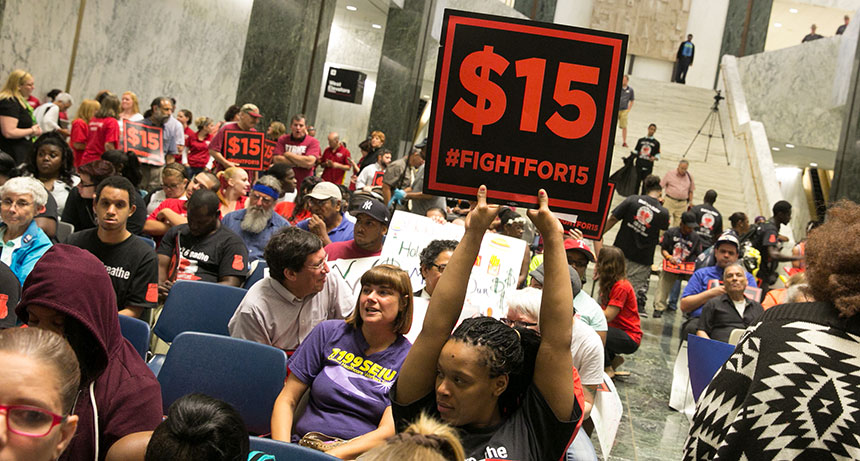"It is an everyday struggle to provide for our family's basic needs," Cheryl Rockhill, a school and bus monitor at Brushton-Moira and a part-time short order cook, testified this week before New York's Wage Board.
The testimony of workers and political leaders lasted several hours beyond the scheduled 10 a.m. to 2 p.m. schedule. The hearing followed a rally at the Legislative Office Building in Albany in support of raising the minimum wage for fast-food workers to $15 an hour.
Only four restaurant workers opposing the minimum wage increase testified, accounting for less than a half hour of testimony in the six-hour hearing.
Rockhill's husband works for a tree service company, which is seasonal. Despite having these three jobs in their North Country household, she said: "We have two children and sometimes don't know where the grocery money is coming from … No matter how hard I worked, I never made enough to run a fitting household and support the needs – not wants – of my children."
The Wage Board — which can examine pay in specific industries — is poised to recommend to the state labor commissioner in July a minimum wage increase for fast-food workers of up to $15 per hour. Many beleaguered workers were among those testifying for the need for improved wages at the fourth and final hearing earlier this week.
"The cost of living rises much faster than wages," said Rockhill, president of the Brushton-Moira Support Staff Association. "That is a fact."
While the campaign, called "The Fight for 15," focuses on fast-food workers' rights to a livable wage and better working conditions, she urged the board to go further.
"We must continue to work to ensure that all minimum-wage workers and near-minimum-wage workers earn enough to support themselves and their families," Rockhill told the three board members. They are Timothy Grippen, retired Broome County executive; Heather Briccetti, president and CEO of the state Business Council; and Peter Ward, president of the New York Hotel Trade Council.

Many school-related professionals such as Rockhill have also been calling for a living wage for years. Rockhill told the Wage Board that, according to state Department of Health, the poverty line for New York for a family of four is $44,863. But working 40 hours a week, 52 weeks a year, at the state's minimum wage yields an annual salary of only $18,200.
"Even in homes with two wage earners, their family will fall significantly below the poverty line," she pointed out. "So many families, including mine, are forced to cobble together several different jobs just to be able to afford to keep roofs over our heads and food in our bellies."
Elected officials testified that low wages put a strain on municipal and state assistance programs, such as welfare and food stamps, shifting the cost burden from the owner of these companies to the taxpayers.
"The Wage Board has the responsibility and the power to fix an industry whose business model keeps thousands of New Yorkers in poverty, and relies on taxpayers to pick up the tab," Rockhill said.
The New York State Labor-Religion Coalition delivered 1,079 signatures in support of the increase to $15.
The hearing, said Emily McNeill, lead organizer of the Coalition, "was a reminder of how much is at stage in this fight. Worker after worker told heartbreaking stories of how they are unable to provide basic necessities for their families."
One McDonald's restaurant worker, McNeill said, testified that she could not afford the fees to send her son on his end-of-the-year field trip, so he spent the day sitting in the principal's office. Another mother works three jobs seven days a week and still cannot pay her bills.
"As people of faith, we know that the poverty wages that create such hardship are immoral," said McNeill. "We know that, in the richest nation on earth – and in one of the richest states in the nation — there is no excuse for the conditions in which so many of our brothers are forced to live." The Labor-Religion Coalition pledged to stand with all low-wage workers "as they fight for living wages, dignity and respect."
There will be opportunity for more public comment once the Wage Board releases its recommendations.